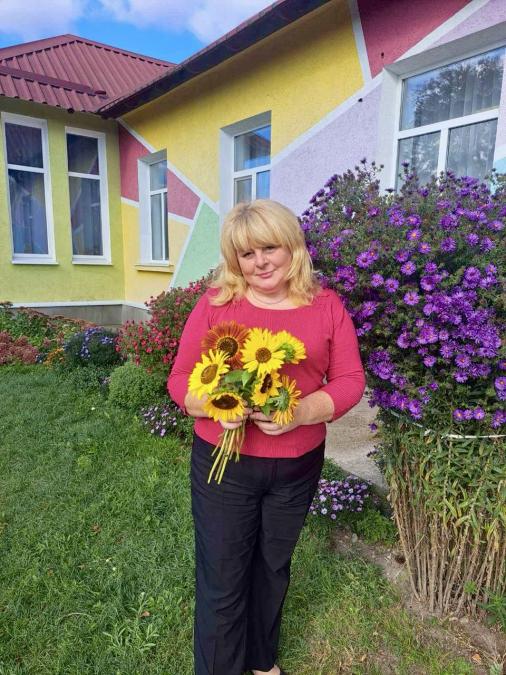Every kindergarten has its own story. But its true value lies not in walls or buildings, but in the people — those who create an atmosphere of warmth, joy, and growth for children every single day. The Komyshnyanske Preschool Institution (nursery-kindergarten) “Malyatko” of the Poltava region is a perfect example. Here, every staff member is a true hero — from the janitor to the teacher, from the cook to the nurse. Together, they form a team united by one goal: to give children a happy and safe childhood.
Today we are speaking with the headmaster of the preschool, Liudmyla Yevheniivna Suslina, about “Malyatko’s” story, her dedicated team, their challenges and victories, as well as the dreams and future of early childhood education.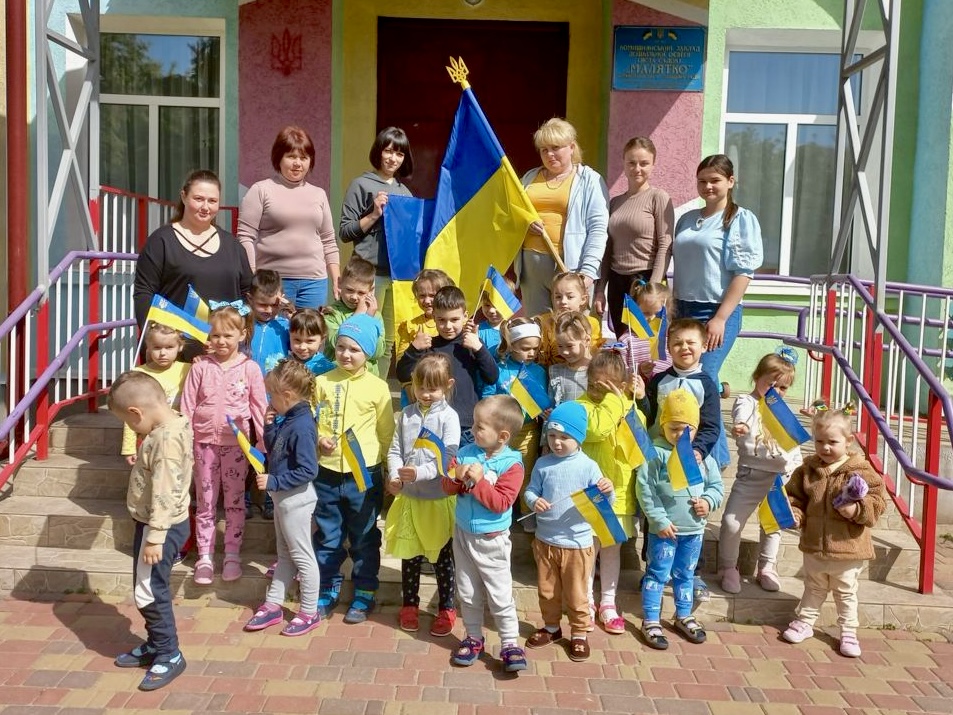
Please tell us about your kindergarten. How many teachers and children do you have, and what is your team like?
Although our kindergarten is small, it grows and develops like a living being — it has its own style and soul. Every employee puts a lot of effort, energy, and love into their work, and you can feel it from the first steps inside.
Our janitor, Vira Bokhonia, takes care of the flowerbeds, playgrounds, and the yard, creating a cheerful atmosphere. Teachers Alina Kulik, Liudmyla Yurchenko, and Iryna Kozhukalo not only teach children new and exciting things but also help them develop essential life skills in communication and cooperation. Assistant teacher Alina Topukh finds an approach to every special child and brings them the joy of learning.
Teacher’s aides Maryna Bubliievska and Tetiana Filatova keep the kindergarten clean and cozy, always ready to help and support both the children and the staff. Administrator Liudmyla Parfenia ensures the children always have fresh fruits and vegetables. Cook Nataliia Parfenia puts her heart and skill into every meal, while kitchen assistant Larysa Kosynska prepares the ingredients and keeps the kitchen spotless. Senior nurse Yuliia Diadenko takes care of the health of the children and the staff, monitoring proper nutrition and daily routines.
But the real gems of our kindergarten are our children. We have 35 kids — always cheerful, smiling, full of life, and ready to create together with our seven teachers. There are two groups — a nursery–younger group and a middle–senior group, the latter being an inclusive group.
You mentioned that your kindergarten feels like a living being. How do you sense its “soul” and character?
It’s something you can feel in the air the moment you arrive at work. Sometimes it’s playful, sometimes calm, sometimes thoughtful. It depends on the mood of the staff, the children, even on how the classrooms are decorated. The weather can even change the way our kindergarten “feels” that day.
Each group has its own personality — they are similar in spirit but still unique. Just like every person has their own mood, each group has its own energy, which is passed on to the children and their parents.
And how does your own mood affect the kindergarten? After all, you’re the one setting the main direction.
I try to keep my emotions under control. I do my best to stay calm and balanced so that any negativity doesn’t influence the work process. When I’m in a positive mood, I feel a surge of energy — I want everything we’ve planned to happen quickly and efficiently. But if I sense that the team isn’t ready for that pace, I don’t act authoritatively. I always consult with the staff, and we look for solutions together. For me, it’s important that our work doesn’t feel forced — it should bring satisfaction, a sense of growth, and a shared desire to move toward a common goal.
How do you keep your mood positive? There’s a lot of negativity around us these days.
I find joy in small things. Good weather — or even rain, which I actually love — feels like nature’s cleansing, a beginning of something new. I love walking in the forest; it’s my grounding and my source of peace. When cheerful children greet me with smiles, that’s already enough to brighten my day.
In my office, I have a big aquarium — the fish seem to wait for me to come and feed them, and that brings joy too.
You don’t need to search for happiness in big, global things — there aren’t many of those right now. You just need to notice the little things. I feel inspired when we manage to accomplish something in the kindergarten, even something small. Or when I see fresh flowers in a vase — right now, I have sunflowers. For me, they’re a symbol of life and continuity.
So, you’re someone who finds happiness in the present moment, in the “here and now”?
Exactly. We live on, we are here and now. The future is uncertain, so we should cherish what we have at this moment. That grounds you, brings emotional balance, and lifts your spirit.
What small things warm your heart every day?
Our aquarium, for instance. Children love fish there — we take care of them together. Or those moments when the children run up to hug me — their energy is so pure and sincere. These small things make the day warmer.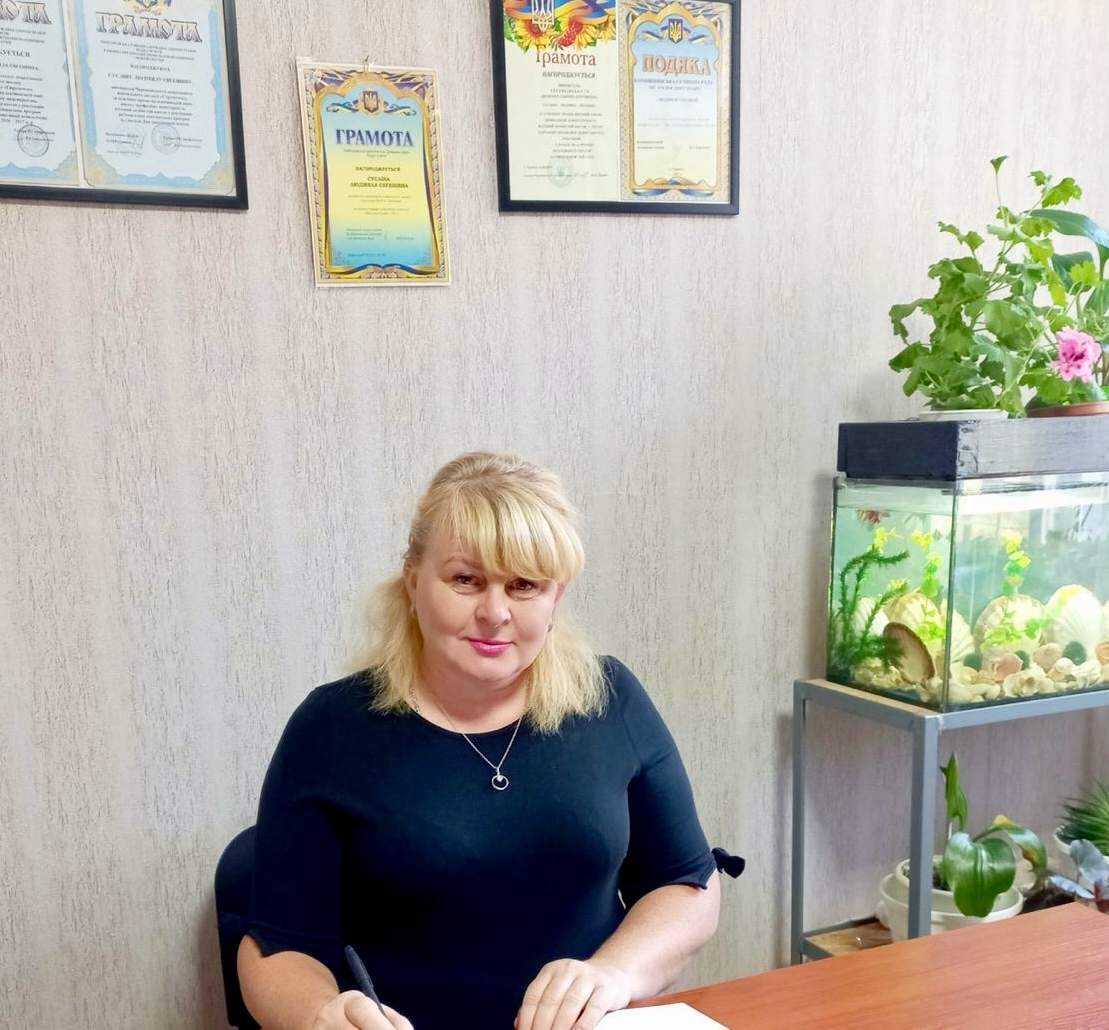
What makes your kindergarten “Malyatko” different from others in the region?
We’re the only independent preschool institution in the Komyshnyanska community of the Myrhorod district, Poltava region. All the other kindergartens operate as branches of schools. That puts a great responsibility on us — we have to know a lot, be resourceful, and lead by example. Many colleagues come to us for advice, and that motivates us to keep improving every day.
What three words best describe your kindergarten?
From a professional point of view — “I know, I can, I want.” We strive to know, to be able, and to apply what we’ve learned in practice.
But if to describe us more broadly — we are blooming, singing, and festive. We love celebrations — we mark traditional folk and national holidays, but we also invent our own. For example, a “Color Day,” when everyone comes dressed in one color, or “Smile Day.” It creates a positive mood and helps everyone escape from everyday routine for a while.
Where do such ideas come from? Does your team support them?
When I plan the educational process or, for instance, the summer recreation program, I always include ideas for creative activities. One of them became the “color” concept. We choose a color for the day, and children look for it around them, connect their mood with it. It works as a psychological technique that spreads positivity to everyone. Most ideas come from me, but my team always supports them. Even parents join in — they come wearing “color-coordinated” outfits together with their kids.
How do you communicate with parents? What do they usually want to know?
Our village is small, so I see most parents personally — in the mornings or evenings, when they bring or pick up their children. In addition, we have group chats where I share and monitor information. If something needs to be discussed — there’s always time for a conversation, I’m always there. I believe any issue can be talked through and resolved together.
In rural areas, parents often ask: “Who upset my child? What did they eat?” I try to shift their focus — to encourage them to ask more about feelings and development: “Who did you play with? What did you learn today? What do you want to try next?” About the child’s life, not just routine. And I’m happy to see this change. When parents pick up their children now, I hear them asking: “What did you learn today? What worked out? What didn’t?”
And what, for you personally, “smells like childhood” in your kindergarten?
The atmosphere. Children are sincere, emotional, open — when I’m with them, I feel like a child myself. That’s the true spirit of childhood.
When I was little, I didn’t like my kindergarten — the smell of the cafeteria, some dishes I just couldn’t eat. That’s why now I never force children to eat something they don’t like. But overall, our kindergarten does smell like childhood — it smells of children’s eyes, smiles, and the feeling that I’m their friend, advisor, and support.
I try to truly understand them, to communicate on their level — that’s important. And my educators are the same. They are always ready to listen, to talk, and to find a solution together.
How many years have you been working in this kindergarten? How did you manage to build such a like-minded team?
I’ve been the headmaster here for two years. Over time, the team has changed — some people left, others joined. Now we have a strong, united group, and everyone moves in the same direction. Each employee has their own character and style — that’s what makes the work interesting. Some stick to tried-and-true methods, while others quickly embrace new ones. What matters is that everyone puts their heart into our shared mission — from the teacher to the janitor, who might sculpt a snowman in the yard so the children can greet him in the morning. And that instantly warms your heart.
I love bright, kind, and purposeful people. I value honesty and fairness — I can’t stand deceit. Any issue can be resolved once you start talking about it.
How do you support your team in difficult times?
We support each other — we discuss our challenges, ideas, and worries. Of course, financial motivation is important, but sometimes a kind word, attention, or praise can warm the soul just as much. Still, in such difficult times, I wish I could also reward people materially — they deserve it.
We also celebrate holidays together, decorate the kindergarten — and that, too, is motivation. We celebrate our colleagues’ birthdays — the team greets them in the morning with smiles, flowers, and warm wishes. That moment of attention makes you feel like you belong, like you’re truly part of something. It’s such a sincere, joyful feeling — to come to work and know that your team is waiting for you.
Who inspires you the most?
I’m inspired by people who say: “I want, I can, I will.” Right now, I’m most inspired by our young educators — they’re eager to try new programs, new projects. They’re curious, proactive, and ready to grow. Together we take part in initiatives like “Bilingual Future,” “Think Equally,” sports weeks, and many others.
But I’m also inspired by simple things — when our janitor or facilities manager creates floral beauty in the yard, and I see the results of their hands’ work. It fills me with joy and strength.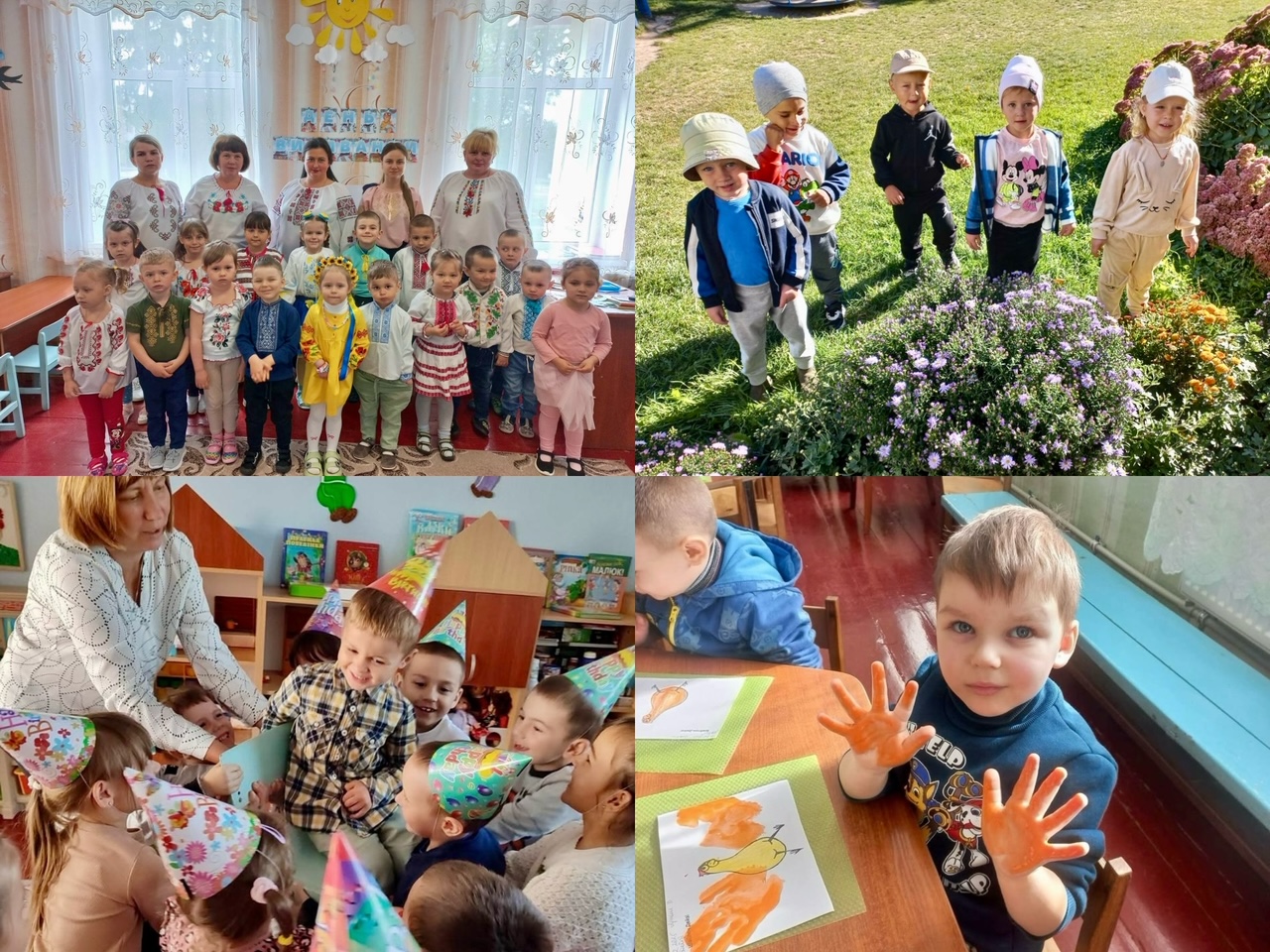
What is the most valuable to you in communication with children?
Their sincerity. Children want to see and understand the world with their own eyes. They come to us so little, and then they leave for school as true individuals. I see how they grow and blossom, and it’s important to me to nurture goodness in them — understanding what friendship, kindness, and support mean.
I want every child to know how to behave, how to comfort someone who’s sad, and how to interact with others respectfully. These are small things, but they shape a person’s heart.
Do you have a special story or moment with the children that has become symbolic for your kindergarten?
Every day is unique, every day special. Sometimes children don’t even want to go home. They say, “I’ll stay with Yevheniivna — it’s so fun with her!”
Moments like that make me realize: we’re doing something truly right.
What words from children have stayed in your heart the most?
When they sense my mood and come up to me asking: “What happened? What can we do to make you smile?” Then they hug me.
Or when they offer their own smile as a way to cheer me up — that’s priceless.
It’s so important that children understand emotions — to recognize feelings, moods, sensations, and to know how to support themselves and maybe even adults, too.
What role do parents play in the life of your kindergarten?
Parents play a very significant role in our kindergarten’s life. Fathers especially often help with practical things. For example, when we needed to replace the fence around the kindergarten — we had the materials, but we needed help with installation and welding. We reached out to our parents, and they immediately responded. They came one by one, whenever they could. Everything happens with mutual respect and understanding, because everyone knows — we do it for the children.
Mothers also take an active part — they help decorate the hall for holidays or assist with organizing events. It’s not material help, but it’s incredibly valuable. Together we create an atmosphere that makes our kindergarten warmer and brighter.
What has been the biggest challenge for your kindergarten recently?
There are many challenges today, but the greatest one is, of course, the safety of the children. We don’t have our own shelter, so we use an adapted space at the nearby school. It was a big task — to figure out how to organize everything properly: to dress the children, lead them out calmly, and reassure them. It’s a huge responsibility.
But we’ve developed clear procedures and keep everything under control.
This has become our biggest challenge — and at the same time, our greatest responsibility. Children trust us completely, and parents believe we can protect their little ones even in the toughest moments. That trust is our biggest motivation every single day.
We’ve also faced challenges with creating a barrier-free environment and setting up resource rooms for children with special educational needs. But we’re moving forward — step by step, steadily and with faith in what we do.
How has the war affected the work of your kindergarten?
We’ve learned to react quickly and to provide emotional support for children. Our team completed UNICEF training on psychological first aid. The most important thing is that we’re working in person, not online — and that alone is a great joy. We can see and feel children, their moods, and teach and nurture them face to face.
What are you most proud of?
I’m proud that we’re competitive, even in a rural area. Our children take part in contests and programs, and we introduce new approaches — such as bilingual education for the younger group. That shows growth and the desire to move forward — and I’m proud of that.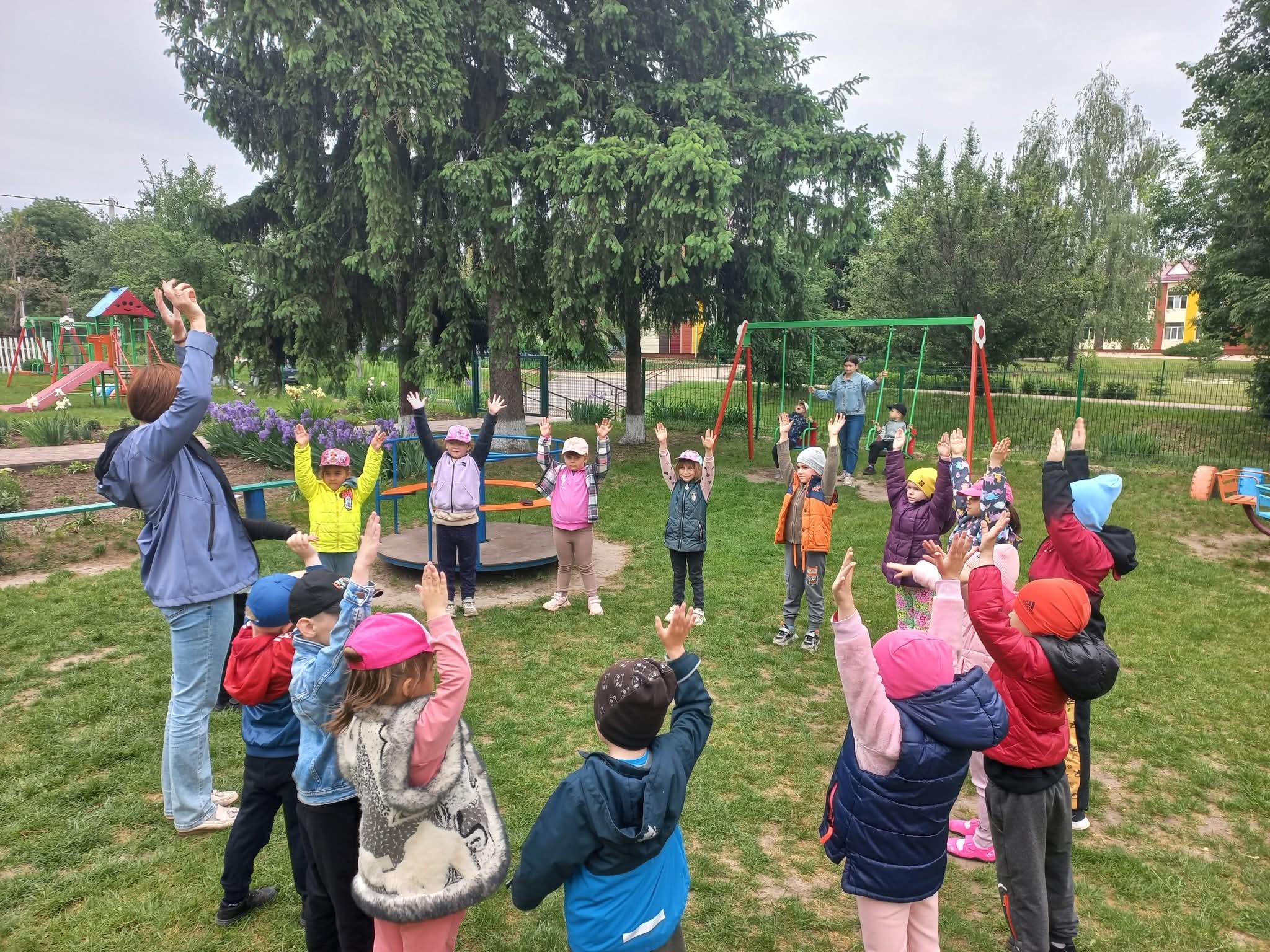
I’m proud that my kindergarten wants and is able to develop, that we have people who are eager to learn and make the world around them better. They want to act, create, and improve — and that gives me faith in what we do.
How do you imagine your kindergarten in 10 years?
I dream of having a music or sports hall, a resource room, and a small modern stadium. I’d also love to have more office and learning equipment.
But the most important thing is that there are children. Because without them, neither walls nor facilities matter. And, of course — I dream of peace.
What do you think preschool education in Ukraine lacks most today?
Respect. Respect for educators and their work. Because without it, it’s hard to build a true system of education and development for children.
It’s not that parents don’t respect us — they do. The issue lies in society’s general perception: many still think a preschool teacher is just someone who watches over children. In reality, an educator teaches, nurtures, takes responsibility for a child’s life and health, and plays a vital role in shaping that child’s personality and worldview.
I would like to see fair pay, and consistent attention and support — not only on Preschool Workers’ Day, but every single day, in real life, not just on paper. And it’s crucial to reduce the paperwork burden so educators can spend more time with the children themselves.
What keeps you in this profession every day and inspires you to move forward?
First of all, the thought: if not me, then who?
Not many people today are willing to take on this responsibility. Personally, I’ve always loved being a teacher the most. I worked as an educator from 1994 to 2023. I see the results in the children’s eyes — I see what I give to them and what they give back.
Now, as a headmaster since 2023, I still experience those moments, but the daily work of a manager often feels endless. There’s a lot of documentation and organizational routine — it’s constant. I don’t enjoy paperwork, to be honest, but it’s part of the job.
What helps is understanding and support from the leadership of the Komyshnia community and the local council — that means a lot.
What has been the most defining moment in your career?
The moment I agreed to take the position of headmaster. I thought about it for a long time, but I don’t regret it.
I didn’t want a purely administrative job that would separate me from the children — and fortunately, I’ve managed to combine both. I still spend time in the groups, I see children, I stay involved in the process. So, I haven’t stepped away from childhood — I’m still right there beside them.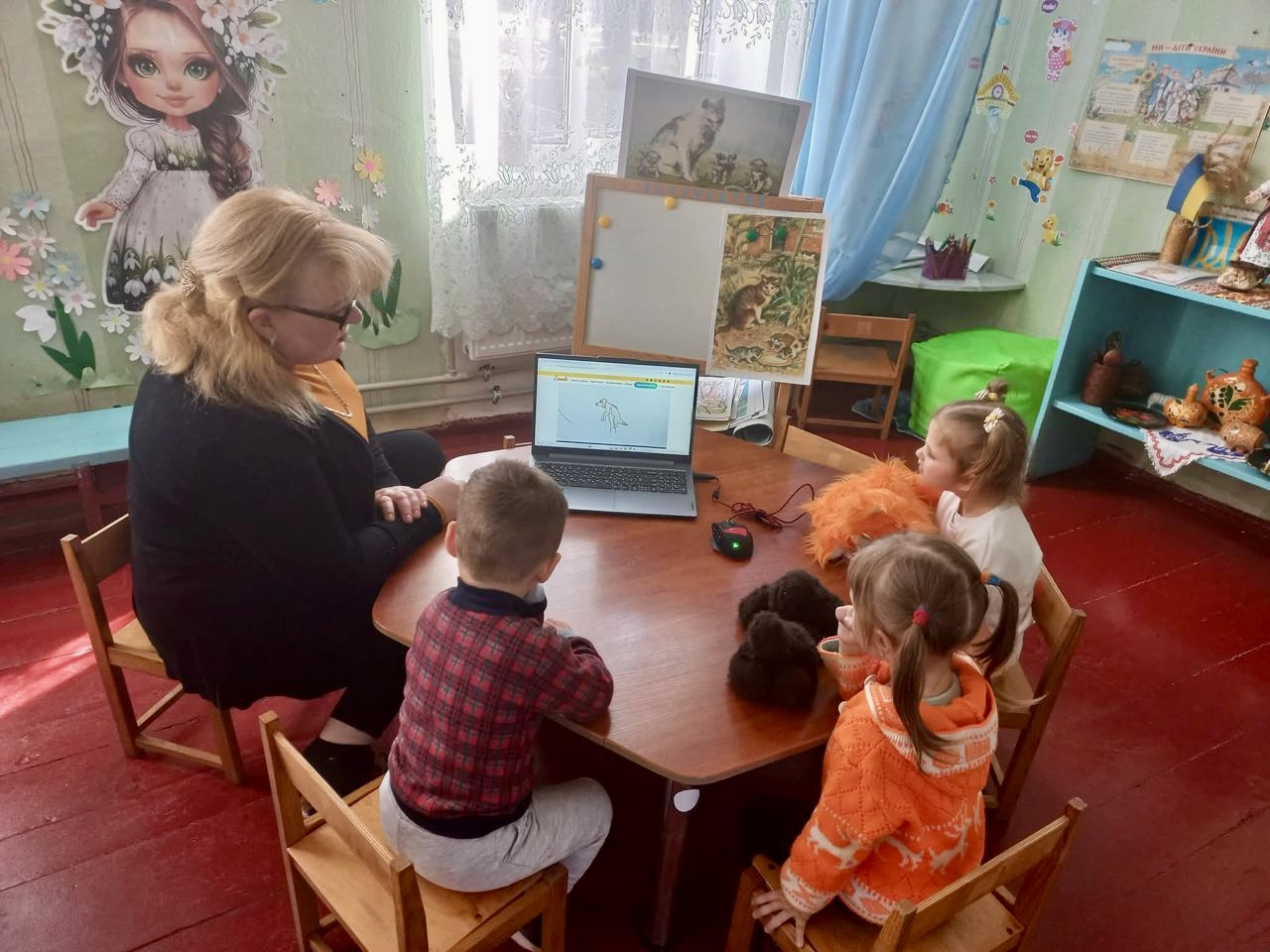
What is your main wish for your fellow educators across Ukraine?
I want to wish everyone patience, peace, respect, and support — from leadership, parents, and colleagues. It’s so important now to feel understood and valued.
And for all of us — fair recognition for our work, both morally and materially.
🎭 Behind the Profession
At the end of each interview, we ask our heroes a few personal questions — ones that reveal them in a new light: beyond their work, yet still with the heart of an educator.
What is your favorite children’s book, and why?
Among children’s books, my favorite is The Wizard of the Emerald City. As we grow older, we start to see things differently — our perspectives on stories, books, and life itself change. For me, this book is about teamwork, support, courage, responsibility, and true connection.
What advice would you give to your younger self?
I started working at the age of 18, and I would tell myself younger: Be braver. Move forward without hesitation. Don’t listen to what others say — stand firm in your beliefs. Don’t be afraid to look silly or to stand out from the crowd.
And most importantly — keep moving forward.
What might surprise our readers about you?
I’m an ordinary, real person. I’m originally from the Donetsk region and have been a displaced person since 2014. I worked as an educator for 10 years in a new community — a completely new environment for me — and in a new team. I managed to prove my knowledge, skills, and professionalism. And now I’m responsible for the entire kindergarten, the staff, and the children as a headmaster.
I’m a mother and have an adult daughter. I enjoy traditionally feminine crafts — sewing, embroidery, and knitting.
I’m simply a woman who loves children and loves life.

